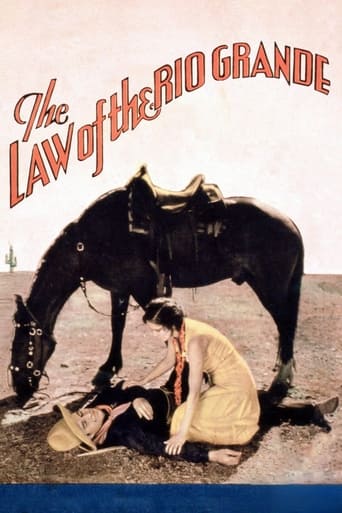Michael Morrison
Since the print I saw at YouTube is so bad, choppy and often dark, with a lot of short pieces missing, I have to do a lot of juxtaposing, but I liked "Law of the Rio Grande."Betty Mack, whom I've seen only twice I can remember, is really adorable, a spunky and good-looking leading lady who deserved more fame.This was the first time I've seen Bob Custer, who had a bit of a starring streak because he was a good cowboy, having been a rodeo performer and thus looking the part.Reportedly, though, he had serious trouble speaking his lines, and major stardom eluded him. (Very sad to say, he became a government employee after leaving films, but at least he was an engineer, not so loathsome a government employee as other positions, such as tax collector or regulator of some kind.)This early talkie western showed the desperate need for a Yakima Canutt to invent better fight scenes. Custer and Edmund Cobb were capable of good fight scenes, apparently, but the technique had not yet been evolved.But the script generally and the story were good enough, and all the players believable enough to make this a very watchable and enjoyable western, if only the print were better.This is another gift of Westerns on the Web, and maybe some day there will be a better print available. I hope you get to see a better version, but in the meantime, watch this one with a very open mind and heart. If only for Betty Mack.And for the chance to complete your own study of the history of B Westerns. It's definitely worth the time and effort.
mccrohan
It was made in 1931 and this was right in the middle of the terrible years of the Great Depression. Thousands of cinemas closed and many that were left could only afford the cheap B films. Often such cinemas were described as " flea pits" but to the millions of unemployed adults and their children , this was their only chance to escape their daily misery and for a few hours escape in the world of movie make-believe. I believe that many would have preferred "The Law of the Rio Grande" to many of the big-budget films offered by the big studios.Just look at the 1931 offerings by MGM.Paramount which are set in a world alien to the unemployed Americans of that era. At any rate, children attending the Saturday afternoon shows would have have love ""Rio Grand" and similar movies
Spuzzlightyear
Strictly by the books western here. And by By The Books, I mean this has generally no surprises and no originality with this western format. A Man On The Run tries to Escape to Start A New Life, when he gets to the next county, he is at first accepted, but then His Former Life Catches Up With Him. This is discovered by A Man Who Is Not To Be Trusted. But the people who have kindly put him up Go On His Side, and luckily, Their Daughter Is Quite Cute… etc etc etc. Absolutely no surprises here. The best part of the movie actually is the opening credits, when it says it's a 'Syndicate Picture' and the female star's name is Betty Mack. I mean, make some crime pictures with her!
Hans J. Wollstein
If nothing else, "Law of the Rio Grande" demonstrates what you could buy for a couple of bucks and a box lunch back in 1931. There is certainly no lack of saloon extras or henchmen in this low budget affair from Syndicate Pictures, a forerunner of sorts of Monogram, niceties that would become prohibitive later in the decade. The cast is familiar and mostly made up of silent screen actors now down on their luck. It is not that Bob Custer and the others were necessarily terrible performers, but they were audibly unfamiliar with dialog and obviously received no help from a direction steeped in silent era film-making. The surviving print of "Law of the Rio Grande" is rather grim in places, a fact that adds to the overall ennui of the too-familiar story. Mark this down as an interesting piece of independent film-making in an era of transition.


